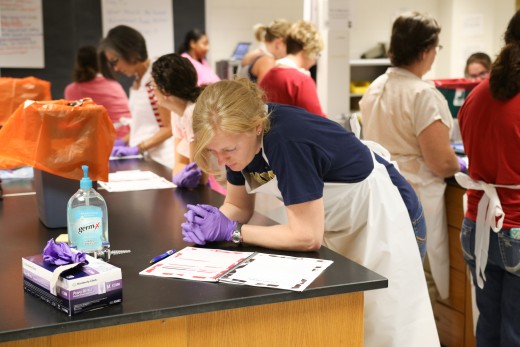 How can a high-school teacher convince students that food science is important, interesting, and a serious career path? These were some of the questions posed in July as more than 50 Family and Consumer Science, Agriculture, and Science teachers from Kansas and Nebraska made the annual pilgrimage to Kansas State University for the fifth annual STEC* Food and Nutrition Science Institute workshop.
How can a high-school teacher convince students that food science is important, interesting, and a serious career path? These were some of the questions posed in July as more than 50 Family and Consumer Science, Agriculture, and Science teachers from Kansas and Nebraska made the annual pilgrimage to Kansas State University for the fifth annual STEC* Food and Nutrition Science Institute workshop.
In previous years, teachers attended the workshop to receive training in the Problem Based Learning teaching method, as well as training in how to implement the curriculum. Using the feedback provided each year, the curriculum was amended, improved, and eventually finalized in 2015. The 2016 workshop ran under a new format, where first-time attendees and attendees from the previous four years attended different sessions to address their needs and history with the three-course curriculum.
Nine returning teachers served as facilitators to lead the sessions in order to increase authenticity of instruction. Each group of teachers, first-time and returning, was scheduled to complete the same labs and activities from the curriculum. The focus for new teachers was to learn the curriculum, while the focus for returning teachers was to discuss options for implementing the curriculum and share “troubleshooting” and “best practices” ideas to keep students engaged in the learning process. Teachers left the workshop with a supply kit to help teach the curriculum in the coming school year, as well as with a new support network of teachers they can reach out to if needed. The workshop was a success and facilitators and teachers alike look forward to next summer’s workshop in Lincoln, Neb.
*The U.S. Department of Agriculture-National Institute of Food and Agriculture (USDA-NIFA) Coordinated Agricultural Project (CAP) grant, titled Shiga-toxigenicEscherichia coli (STEC) in the Beef Chain: Assessing and Mitigating the Risk by Translational Science, Education and Outreach, seeks to significantly advance evidence- and action-based beef food safety knowledge to protect public health. This project is targeting the eight most important STEC serotypes that cause human illness in the U.S. The grant has 5 objectives; Objective 5 concerns Risk Management and Education and focuses on training the current and future workforce and consumers to control STEC. To train the current and future workforce, a team comprising of staff from Kansas State and the University of Nebraska–Lincoln have developed a curriculum for secondary education –programs to gain access to the students who are in these classrooms.
